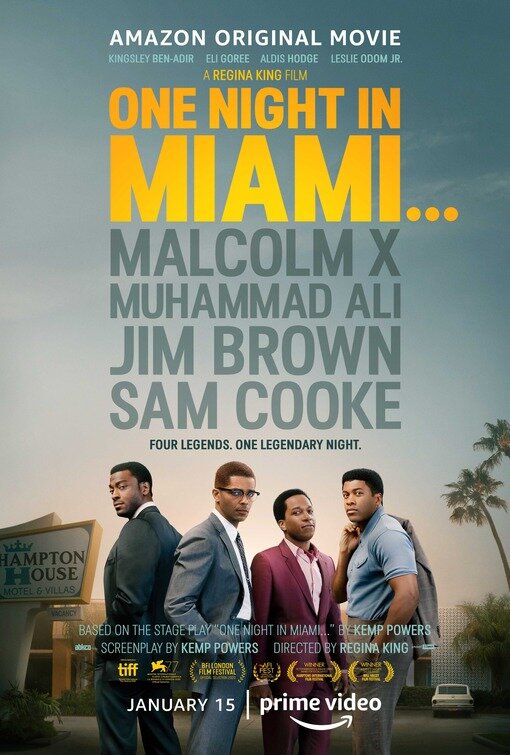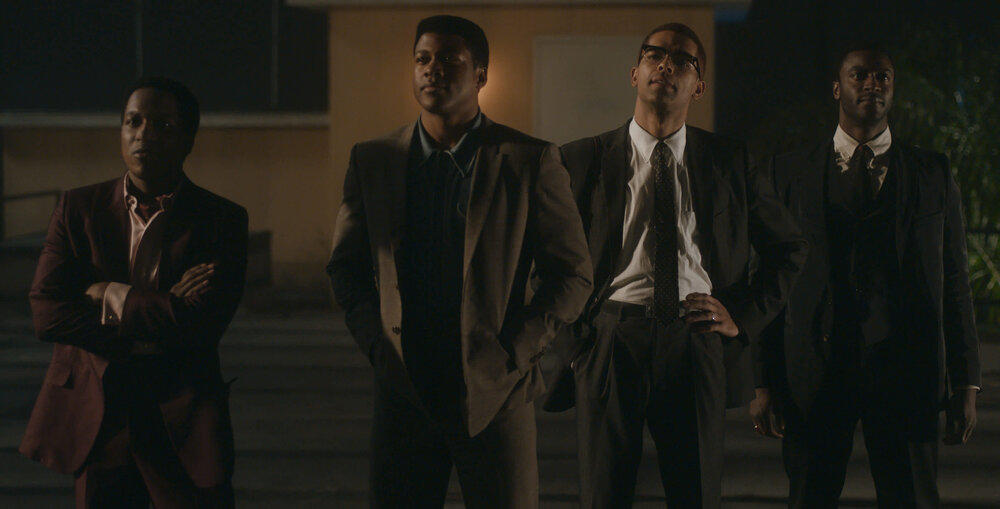One Night In Miami... (2020)


SHOULD I SEE IT?
YES
Brilliantly written, acted, and directed by Regina King, One Night in Miami… is a powerful cap on a year where the racial divides of 1964 are just as present in 2020.
A quartet of talented actors do not miss, but Kingsley Ben-Adir and Leslie Odom, Jr. really deliver as Malcolm X and Sam Cooke, respectively.
The film gives us iconic figures as real people, with visible flaws they wrestle with, as they explore their place within their community and changing world.
NO
This is adapted from a stage play, and largely occurs in a one-setting environment. The dialogue is dense and requires you to pay attention. If you are a casual, escapist movie fan, One Night in Miami… may prove to be a challenge.
One potential barrier is a lack of knowledge around why Malcolm X, Muhammed Ali, Jim Brown, and Sam Cooke are important historical figures. The film assumes you know who they are and spends little time educating viewers on their place in history. (Though, maybe that’s why you watch?)
As wildly acclaimed as this is, it is possible that this presentation just lacks interest to you. More than just a staged discussion, One Night in Miami… is impressive but might feel like work for some potential viewers.
OUR REVIEW
Oscar-winning actor and first-time director Regina King has delivered one of the best films of 2020 with One Night in Miami…, a searing, evocative, conversational adaptation of Kemp Powers’ acclaimed 2013 play of the same name.
The premise is a clever one. On February 25, 1964, Cassius Clay (the future Muhammed Ali), Malcolm X, Jim Brown, and Sam Cooke spend an evening together discussing and debating their lives in Malcolm’s motel room after Clay defeats Sonny Liston to become the new heavyweight boxing champion of the world.
This hang, for all intents and purposes, never occurred. Powers brilliantly blends real-life stories and facts about the men as a jump off for these characters to analyze their place in a raw and wounded world – as celebrities, as men, as Black men, as willing or unwilling spokespersons for racial injustice, and as public figures somewhat unaware of the power they wield from the fame they have achieved.
King and Powers lock the men mostly in Malcolm’s motel at the Hampton House in Liberty City. Told they are attending a party thrown by the civil rights leader celebrating Clay’s big win, the three men arrive expecting a party - with girls, booze, and whatever else can be mixed into the celebration. Instead, a tightly wound and serious Malcolm, with two watchmen on guard outside his room, steer everyone through a night of conversation which will forever change the way each man views his place in the world.
King makes us a fifth attendee, though she is careful to keep us out of the way. To open the film, we walk through moments of setback for each character; moments which contribute to the emotionally charged debates and conversations we will be privy to later in the film.
Clay/Ali (Eli Goree) is feeling superior, as well he should, having just won the World Heavyweight Title when no one expected him to do so. Cooke (Leslie Odom Jr.) is a widely respected crooner, whose success in running a record label and crossing over to white pop audiences with his music he sees as a triumph. Brown (Aldis Hodge) is a bit fed up with being the most dominant running back in the history of the NFL, up to that point, and has a desire to go to Hollywood. And Malcolm (Kingsley Ben-Adir) is facing a crisis of conscience. He is set to break ranks with the Nation of Islam, a secret which will come to roost before the night is over.
To be effective, performances cannot miss in a film like this and this ensemble hits every mark.
As Malcolm, the British-born Ben-Adir is captivating and powerful. Producers and directors should keep him in mind when the time comes to play former president Barack Obama in a future biopic. As the civil rights leader and political firebrand, he is at once paranoid and full of fury. Studied and eager to call out, challenge, and counsel his friends, his falling out with the Nation of Islam carries a burdensome weight.

Clay would go on to take the name Muhammed Ali, as we all know, in the days after his victory. Malcolm’s looming departure proves a major complication between the two men, as Ali agreed to make a public proclamation of his joining the Nation of Islam and converting to the Muslim faith. Goree captures the distinctive cadence and lilting arrogance of Ali which the legendary champion would make famous. The young actor also exhibits a cocky, 22-year-old view of the world, dubbing himself “The Greatest” at least a dozen times in Malcolm’s motel suite.
Hodge’s performance as Jim Brown is more reactionary than the work of his peers, but Powers crafts moments allowing him to stand strong. Hodge has the film’s first stunner of a moment when a seemingly innocuous chat he has with a white Southern man (Beau Bridges) takes a gut-punch of a turn.
Tony Award winner Leslie Odom, Jr. (Hamilton) is a dynamo as Cooke. Though Powers skirts over some of Cooke’s infamous personal struggles for purposes of his script, Odom presents Cooke as both smarter than he appears and naïve as to how he is perceived by members of his own community. The back-and-forth exchanges between Cooke and Malcolm are some of the film’s fiercest, the two men challenging each other again and again, leaving bruising verbal wounds increasingly as the night goes on. Odom also delivers pitch perfect vocal work in replicating some of Cooke’s most well-known songs.
Sadly, both Malcolm and Cooke would be dead within one year of Ali’s big win. That sobering truth hangs a pall over the proceedings. There is an urgency pulsing within the film and King makes Malcolm’s room feel both large and small. At times, there feels like ample space for these men to air out grievances, eat some ice cream, and share some laughs. In other moments, the men feel pressed on top of each other, fighting for air, desperate to speak and demanding to be heard.
The men are rivals, we suppose. Malcolm knows the specific impact his friends have made in the world. But in 1964, a world still devastated by racism, segregation, and unspeakable acts of horrific violence against the Black community, Malcolm cannot shed his agitation and pushes his friends to be provocative and radical and make statements on behalf of Black brothers and sisters everywhere.
I loved One Night in Miami…, King’s first film is a stunning and evocative look at a world full of truths and realities which I, as a white man, will never personally experience. With that said, I acknowledge that mileage may vary for some viewers. This is dialogue-rich material, almost literally confined to one motel room for approximately 75% of the film’s run time.
Occasionally characters step out – a private payphone call, a secret dash to the liquor store – but we see lives change within the walls of that Hampton House motel, with King and Powers steadfast in helping us understand what these exchanges mean, and why they are so important for all of us to hear and consider.
CAST & CREW
Starring: Kingsley Ben-Adir, Eli Goree, Aldis Hodge, Leslie Odom Jr., Lance Reddick, Christian Magby, Joaquina Kalukango, Nicolette Robertson, Michael Imperioli, Lawrence Gilliard Jr., Beau Bridges
Director: Regina King
Written by: Kemp Powers
Based on the stage play, “One Night in Miami…,” written by Kemp Powers
Release Date: December 25, 2020 (theaters); January 15, 2021 (Amazon Prime)
Amazon Studios
